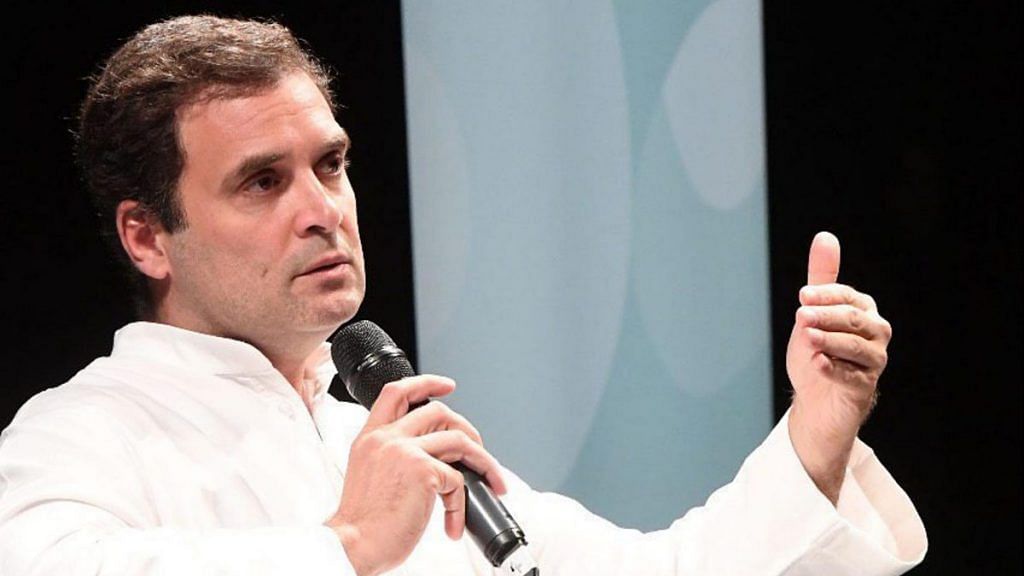Rahul Gandhi argued that youth unemployment has been a key driver of lynchings in India.
In March 2010, I was sitting on the steps of a degree college in Meerut, Haryana, and chatting with a friend named Yashpal, a Dalit in his late 20s.
He had BA, BCom, MCom and BEd degrees, and applied for over 40 government jobs. “I have tried so hard, but nothing has happened,” he said.
“So how do you spend your time?” I asked. “Kuch nahin. Kuch nahin (nothing, nothing),” he replied. “Bas, main timepass kar raha hoon. (Mostly, I just do timepass).”
Addressing a summer school in Germany Wednesday, Rahul Gandhi highlighted the problem of youth unemployment in India and the particular struggles of tribals, Dalits, and minorities. There is a real risk, he said, “of excluding a large number of people from the development process”.
Also read: Where are the jobs? Modi government ‘employment bank’ may soon offer answer
One in 10 people in the world is an Indian youth under 30. India’s much-vaunted economic reforms in the early 1990s brought new prosperity to the upper middle classes but it did not create enough jobs. Many young people invested in the dream of upward mobility but have been unable to acquire the small number of well-paid, secure jobs.
But Rahul argued that youth unemployment has been a key driver of lynchings in India. More than that, he saw joblessness as a precursor of future terrorism. Rahul cited the example of jobless Iraqis joining an insurgency, which “entered the empty space in Iraq and in Syria and connected with… a horrific idea called ISIS”.
Over the past 20 years, I have been studying the social lives of unemployed youth. But I have seen surprisingly little evidence of their involvement in organised violence.
Also read: Rahul Gandhi says excluded groups may turn to ISIS-like extremism: Realistic or alarmist?
To be sure, there is much melancholy. Timepass is common and it involves a feeling of being left behind, detachment with everyday life, and being mired in ennui. Avoiding negative introspection can become a job in itself.
It is true, too, that youth unemployment or underemployment and associated cultures of male loitering have led to urban unrest, gender violence, and fuelled illegal practice in many cities and rural areas in India.
Many underemployed youth are becoming involved in illegal land sales, corruption in the management of government contracts, and shadow markets in educational services – the latter especially damaging because they effectively reproduce the system that produced unemployed youth.
But youth unemployment or underemployment is also productive. It is productive of relationships. It would be dangerous to take Yashpal’s statements at face value.
Timepass was not ‘nothing’, I found during my study in India. Timepass was actually the basis for vibrant youth cultures. It served as a type of social solvent, dissolving antagonisms based on religion and caste.
While doing timepass, young men from Dalit and higher caste backgrounds shared cigarettes, bought each other chai, stood around on bus stops with their arms draped around each other’s shoulders. A type of youth culture flickered into life – we’re all stuck as underemployed youth in lousy provincial degree colleges, so we might as well get along with each other and make do.
Timepass also led to social service. Young people across class, caste, religion and gender campaigned against corruption in the university administration, lobbied for students to obtain scholarships, and worked to address problems of police harassment. They tried to increase public understanding of the struggles of unemployed youth, worked to improve standards of tuition in the city, and even went back to rural areas to advise younger youth.
Also read: India suffers from underemployment not unemployment: NITI Aayog’s Rajiv Kumar
On the whole, the timepass generation said they had the time, motivation, and knowledge to do social service (samaj seva), and helped younger youth in particular.
Indeed, a type of positive feedback was at work here. Educated underemployed youth were concerned that the generation coming after them should not have to suffer the same indignities.
Rahul Gandhi is right to raise the spectre of mass unemployment, but wrong to assume that it will inevitably lead to violent action.
Craig Jeffrey is Director of the Australia India Institute and Professor of Human Geography, University of Melbourne. He is the author of Timepass: Youth, Class, and the Politics of Waiting in India
